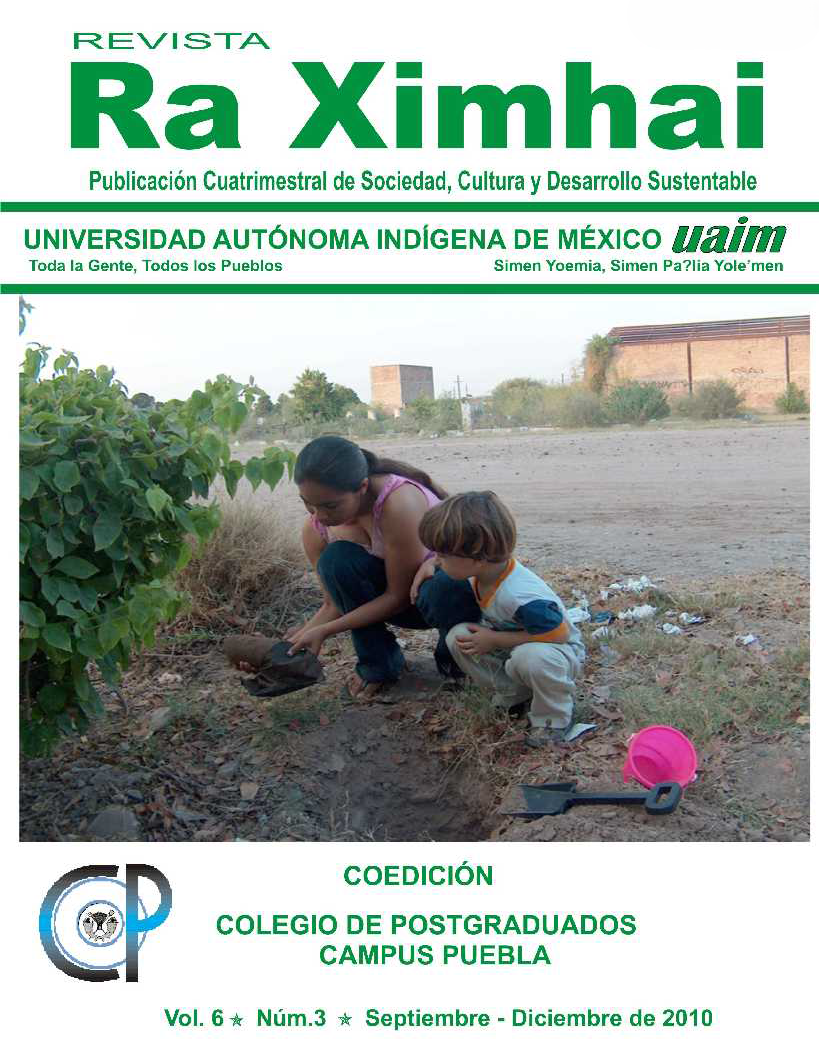El resguardo colectivo del patrimonio bio-cultural como garantía de la resiliencia de los sistemas socio-ecológicos de los pueblos en el estado de México
DOI:
https://doi.org/10.35197/rx.06.03.2010.06.gpPalabras clave:
patrimonio biocultural, resiliencia, sistema socioecológicoResumen
El canon internacional para el reconocimiento del patrimonio de los pueblos originarios en la última década y media se ha estructurado desde tres ámbitos convergentes: el empresarial, el académico y el legal. Los esfuerzos de los pueblos originarios por insertarse en los procesos de toma de decisiones han sido fructíferos, logrando que se establezca un comité especial para la discusión del Artículo 8j del CDB. Sin embargo, a medida que transcurren los años de negociación, incrementa la incertidumbre de la viabilidad de los acuerdos, debido a que los pueblos no están preparándose adecuadamente para aprovechar las garantías otorgadas. Se ha comprobado que, cuando al interior de un pueblo se mantienen prácticas tradicionales de resguardo del patrimonio biocultural, la resiliencia del sistema socioecológico es mayor, pudiendo responder a distintas crisis sin poner en riesgo su integridad e identidad. El problema detectado es que factores adicionales como el cambio climático local, han reducido la disponibilidad de agua, de fauna y flora apropiables in situ, de alimentos básicos y de dinero. Esto afecta la capacidad de los pueblos para mantener tales prácticas de resguardo, lo cual va en detrimento de una respuesta adaptativa sustentable. El modelo de UI obliga a practicar la investigación dialógica, participativa y corresponsable, a fin de detectar las debilidades de los sistemas socioecológicos y diseñar estrategias para abordar los problemas, a fin de garantizar la resiliencia interna. El reto mayor al que se enfrenta la UIEM es lograr, con el IMPI, que se registren aspectos del patrimonio de los pueblos de la entidad de manera colectiva.
Descargas
Citas
Organización Mundial de la Propiedad Intelectual. 2001. Conocimientos tradicionales: necesidades y expectativas en materia de Propiedad Intelectual. Informe relativo a las misiones exploratorias sobre propiedad intelectual y conocimientos tradicionales (1998-1999). Ginebra, No. 768(S).
Rojas, Francisco. 2009. Pensar la soberanía alimentaria en el contexto de los pueblos indígenas en tiempos de globalización, en ςayu’ςe, Semillas y Mensajes de Etnoeducación, Revista de Etnoeducación. No. 13:44-45.
Secretariat of the Convention on Biological Diversity. 2008. Acces and Benefit-Sharing in Practice: Trends in Partnership Across Sector. Montreal, Technical Series No. 38.
Simón, Juan de Dios. 2008. La Expresión del poder político de los pueblos indígenas y la educación intercultural bilingüe en Bolivia, Ecuador y Perú, en El Vuelo de la Luciérnaga. Revista Semestral para el Diálogo entre personas de Pueblos y Nacionalidades Diferentes de UNICEF – Fondo para las Naciones Unidas para la Infancia. No. 1: 92-107.
Tebtebba Foundation. 2002. Indigenous Peoples Submissions. Indigenous Peoples and Sustaintable Development 1. 2nd PrepCom of
Descargas
Publicado
Cómo citar
Número
Sección
Licencia
Derechos de autor 2010 Geraldine Patrick Encina, Mindahi C. Bastida Muñoz

Esta obra está bajo una licencia internacional Creative Commons Atribución-NoComercial 4.0.
Usted es libre de:
- Compartir — copiar y redistribuir el material en cualquier medio o formato
- Adaptar — remezclar, transformar y construir a partir del material
- La licenciante no puede revocar estas libertades en tanto usted siga los términos de la licencia
Bajo los siguientes términos:
- Atribución — Usted debe dar crédito de manera adecuada , brindar un enlace a la licencia, e indicar si se han realizado cambios . Puede hacerlo en cualquier forma razonable, pero no de forma tal que sugiera que usted o su uso tienen el apoyo de la licenciante.
- NoComercial — Usted no puede hacer uso del material con propósitos comerciales .
- No hay restricciones adicionales — No puede aplicar términos legales ni medidas tecnológicas que restrinjan legalmente a otras a hacer cualquier uso permitido por la licencia.








